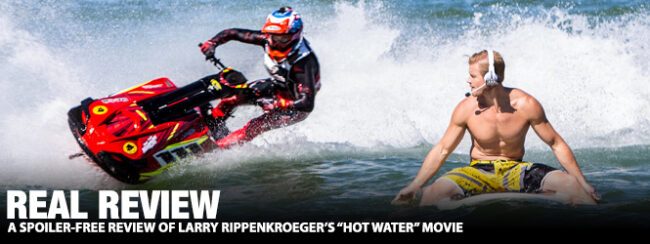
The world of professional jet ski racing has experienced tectonic changes since the days when Larry Rippenkroeger once ruled the water. In those nascent years, earning an IJSBA championship required athletes to excel at buoy course racing, slalom and freestyle. You had to be a triple threat. Yet, to the victor went the spoils, as huge payouts from big name tour sponsors lured athletes from across the globe. Corporate support yielded big dollar results wherein team riders could literally be full-time racers. The stakes were higher, the competition fiercer, and the energy was radioactive.
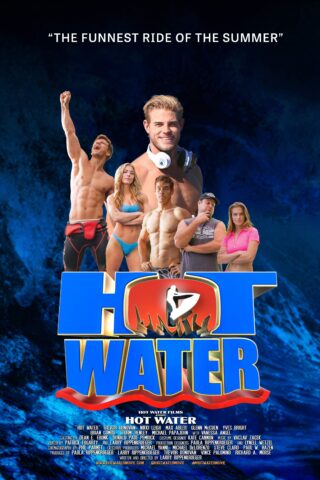 Yet, as the current world of professional jet ski racing is so dramatically distanced from those early years, it gives Rippenkroeger’s “Hot Water” an underlying melancholic sentimentality that lurks beneath the surface – particularly for the audience who remember what “it used to be like.”
Yet, as the current world of professional jet ski racing is so dramatically distanced from those early years, it gives Rippenkroeger’s “Hot Water” an underlying melancholic sentimentality that lurks beneath the surface – particularly for the audience who remember what “it used to be like.”
Initially, that’s what many of us felt Rippenkroeger’s film was targeting to do: illustrate an optimized world where professional jet ski racing thrived in a modern world. A sort of thesis on “how it ought to be.” Rather, “Hot Water” leaves out any commentary on the current state of the sport or how it could be bettered.
Of course, challenging the status quo was never Rippenkroeger’s intent. “Hot Water” began as a collection of vignettes, scenes reenacting anecdotes collected over decades spent on the road competing on the IJSBA National Tour.
It was only in lacing these events into a cohesive narrative did the film’s story begin to form: a hotshot kid with aspirations to be a professional jet ski racer is taken under the wing of a retired undefeated champion. Albeit formulaic, this structure follows American mythologist Joseph Campbell’s The Hero’s Journey almost to a “T”, all amid a backdrop of a fictional National Tour and extraneous circumstances.
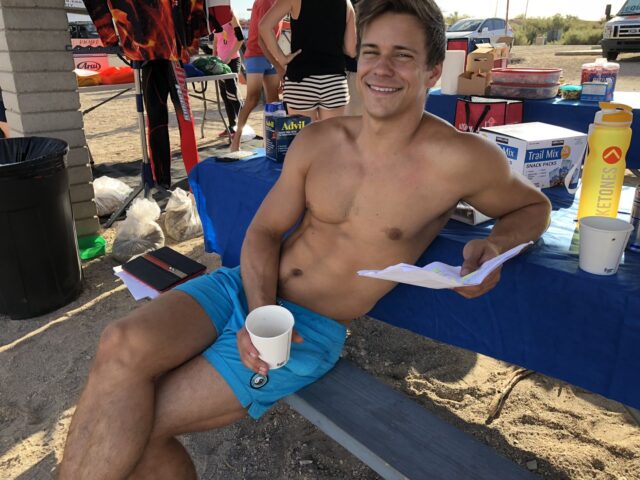
Campbell details the hero’s journey in seven key steps: 1. the call to action; 2. crossing the threshold from the known to the unknown; 3. receiving supernatural aid from a teacher or mentor; 4. making new allies; 5. facing challenges and/or temptations; 6. reaching the abyss, death and rebirth; 7. returning home a transformed being. This template underpins almost all of the greatest tales ever told, be them historical fact or entertaining fiction. From the life of Jesus Christ to that of Luke Skywalker. Many screenwriters follow it unknowingly, while others hold to it like a navigational chart.
The proverbial hot shot in Rippenkroeger’s “Hot Water” is Glenn McCuen playing novice racer Billy Burnett. For the most part, McCuen’s portrayal is somewhat monotone, letting the actor’s wry smile carry his Burnett through most of the film’s 100-minute runtime. It’s only in Burnett’s lowest point do we see McCuen give his character something truly to bite into. [minor spoiler alert] As he contemplates quitting, McCuen tries to play it cool over the phone to his mother, but we the audience know – as does his mom, played by Vanessa Angel – that Burnett is at his lowest point. It’s brief but it’s easily McCuen’s best scene.
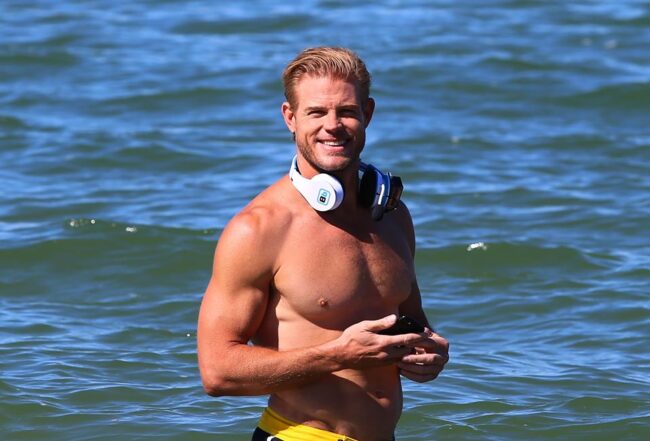
Serving as Burnett’s mentor is 5-time World Champion jet ski racer Jared Harper played by Hallmark Channel go-to and “90210” heartthrob Trevor Donovan. Initially, Donovan’s Harper is entirely all-too one-dimensional as the reticent veteran unsure of his newest ward. Harper is a neutral character, never giving the audience reason to like or dislike him, as his irritation with Brunett is equal to the viewer’s. And somewhat comedically, after multiple mentions of Harper’s time spent with monks in Tibet (wait, what?) when it’s time for Harper to impart some mystical wisdom, Donovan produces actually pragmatic advice.
Despite Donovan’s near entire screentime seen either half, or in one extended scene, completely naked, it’s in “Hot Water’s” quietest scene [minor spoiler alert] where a newly humbled Harper confronts Burnett’s distant father where Donovan’s talent truly shines. In doing so Harper successfully marries the two halves of his student’s fractured world, gifting Burnett the means to carry forward. It too survives as a slow paced character piece in the midst of the whirlwind that is an action comedy, so be warned. If you blink, you might miss it. But it’s there, and its easily the second best scene in the film. Donovan and Michael Papajohn do great work here.

Yet, the film’s greatest standout is Nikki Leigh playing Burnett’s love interest and Women’s National Champion, Kelly Weber. Not only is Weber’s story arc demonstrably more compelling than the rest of the characters, but Leigh’s performance is easily the strongest of the cast. In what could have been a thankless role, Leigh’s Weber is complex, nuanced, and thoughtful. It’s clear Rippenkroeger saw this during the production and gave Leigh the film’s climax. Weber’s conflict isn’t so much between risking her career for a newfound relationship, but risking the safety of her current sponsorship for winning on her own terms. Her motives are her own. Again, Leigh’s performance here is the film’s high point.
[Minor spoilers ahead] Burnett’s arc from an arrogant-yet-talented jet skier to a polished racer as well as a team player is satisfactory, and in pushing through his tendency to quit when the going gets tough, he regains his father’s trust. Conversely, Harper’s distancing from the sport is never truly resolved; he left due to an injury and fear of failing were he to return. Doing so vicariously through Burnett provides this resolution, but its less personal. Weber’s is the most triumphant; having labored to achieve her success, she openly defies protocol to win – both morally and professionally – on her terms.
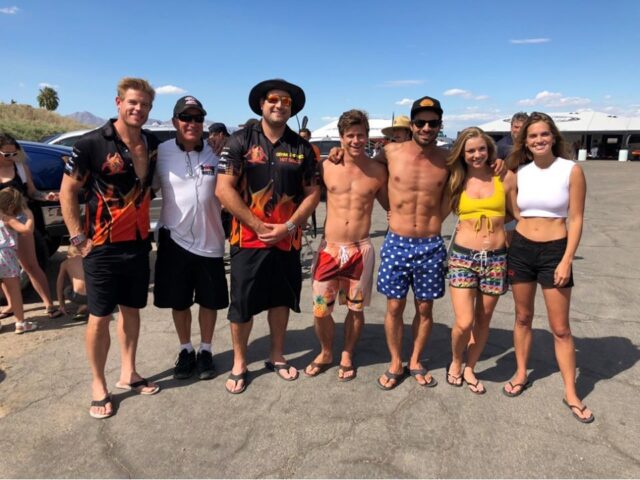
I was disappointed to see the film’s conclusion literally shown in the promotional material. Burnett’s conclusive win, flanked by his teammates, love interest and estranged father was featured in both the teaser trailer and on the website. It’s a small irritation, given that it would be wholly expected that the hero would succeed in his goal – particularly in a film like this, but it would’ve been nice to have kept some scenes a secret. And while trying to play the typical foil to the protagonists, Brian Combs’ dastardly Richard Hurt is entirely underdeveloped – being told of his underhanded ways rather than being shown. [end spoilers]
In all, “Hot Water” is a really fun, summertime romp that’s reminiscent of equally low budget action comedies like “Ski School,” “Rad” and “Airborne” chocked full of on-the-water jet ski racing action, attractive people and about 1 1/2-minutes of Chris MacClugage’s buck naked buttocks. (No, really.) With all of that, “Hot Water” is well worth the price of admission. Even without COVID-19 shutting down cinemas, “Hot Water” was not expected to see a widespread theatrical release. So permitting folks to digitally rent the film via Vimeo was a smart strategic move, and will hopefully drum up the kind of word of mouth that propelled theater underdogs into cult classics like “This is Spinal Tap” and “Dazed and Confused.”






